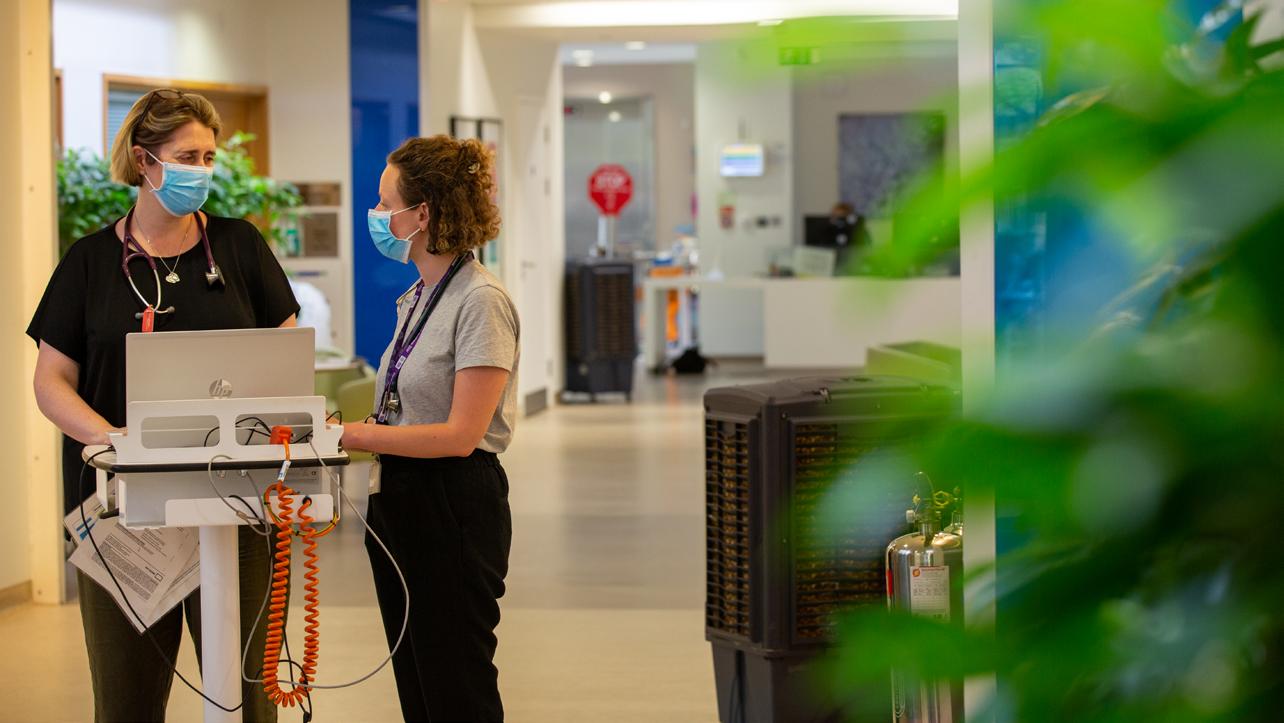BEYOND 130: our plan to reach the people who need us
Our plan for growth: 2022-27


Our plan for growth: 2022-27

We are the oldest hospice in the UK, having celebrated our 130th anniversary in 2021. We are the only specialist end of life and palliative care provider to over 750,000 Londoners across seven London boroughs. In 2019 our care was rated “Outstanding” by the CQC. We care for around 2,500 patients every year, the majority of whom receive care at home.
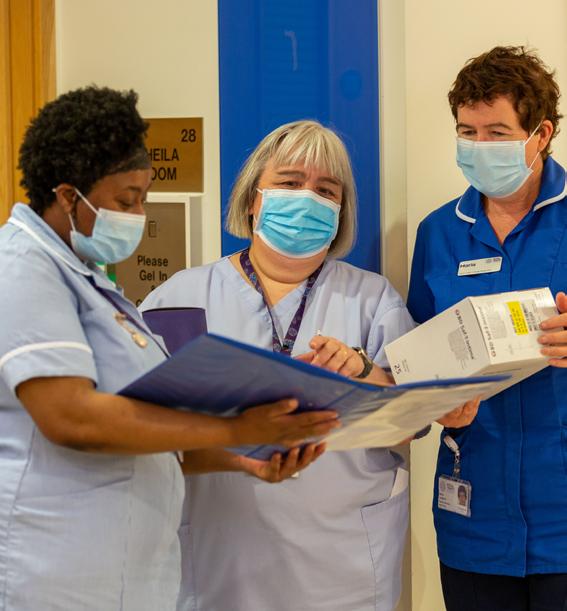
The pandemic prompted an urgent and rapid re-calibration of Trinity’s working practices, clinical models and income generating activities to ensure that our doors remained open. We have weathered the pandemic well thanks to the tenacity, talent and commitment of our people and the overwhelming support of our community.
This document provides a roadmap for Royal Trinity Hospice, outlining what we want to achieve for our population over the next five years and how we plan to deliver this.
It is estimated that between 2014-2040:
> Deaths per annum will increase by 27% in England and Wales;
> There will be a 75% increase in deaths occurring in >85 year olds (from 39%-54% of all deaths);
> The impact of the pandemic is so far unknown but likely to increase the number of people requiring specialist palliative care.
Source: Etkind et al, BMC Medicine (2017); Bone et al, Palliative Medicine (2018)
Modelling Trinity’s future growth
Assumptions:
> National predictions for growth will apply (as above)
> We are currently reaching 46% of the people who die in our catchment every year who could benefit from our care.
> For every 3 patients we care for, we support 1 family member. Our reach to support relatives and loved ones will also need to increase.
To meet ‘all’ the unmet need we would need to care for ~1,300 more patients annually (~3,800 total) and ~700 more carers (~1,200 total). Over the five year period, this would require growth of ~250 patients and ~140 carers each year.
The total number of patients we supported per annum was incrementally increasing year on year until the pandemic prevented a proportion of face to face individual patient and group activity.
All religious groups, all non-white ethnicities and ‘other white’ ethnic groups are under-represented in our patient numbers.
We will work to identify and understand any internal and external barriers preventing communities accessing our services and endeavour to overcome them
Across the boroughs in our catchment, the % number of deaths which may have needed specialist palliative care input where Trinity was not involved ranges from 61% (Hammersmith and Fulham) to 43% (Westminster).
We will ensure everyone in our catchment has equal access to our care
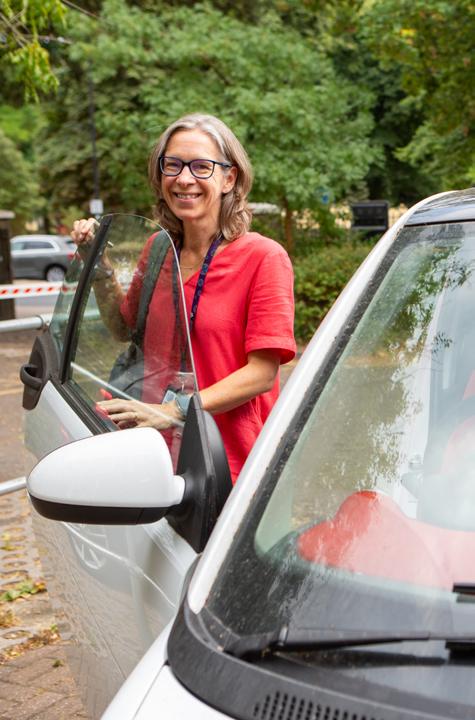
We estimate that we only reach 46% of the people who die in our catchment each year who could benefit from our care. (During the pandemic this reach was lower).
We will increase the number of patients who benefit from our care
We are seeing a reduction in the proportion of 85+ year olds, against a national trend of an ageing population.
We will review what support older frail people need from Trinity in collaboration with other healthcare professionals
Our datasets on our patient demographics are incomplete and improved completion is a priority moving forwards to ensure we are reaching everyone who needs us.
> To provide expert and compassionate end of life care, support, information and advice to patients and those close to them
Our vision
> To provide education and information, working collaboratively with all health and social care providers, to ensure as many people as possible benefit from our expertise
> To improve communities’ relationship with death and dying, allowing them to live every moment
> To challenge and overcome barriers to equity, diversity and inclusion in our services
> To be true to our values and a good employer.
Our values
“To be the local hospice of choice for all those who need us, and an example of excellence in end of life care”
“To expand our reach to all of the people in our community who would benefit from our services, through an inclusive and collaborative approach to delivery while maintaining outstanding quality and financial balance.”
Our five year objectives
1. To make best use of our existing workforce model and facilities, utilising digital and virtual working
2. To strengthen our collaboration with partners, utilising innovative pathways
3. To extend our reach across all of our diverse communities – particularly those who traditionally do not access palliative and end of life services

4. To invest in expanding our services, workforce and facilities
5. To ensure fundraising, retail operations and NHS income matches growth in activity and associated operational costs
Retail
Inpatient unit
> Patient pathway review and optimisation
> Re-establish dementia respite service
> Improve recruitment and retention to workforce
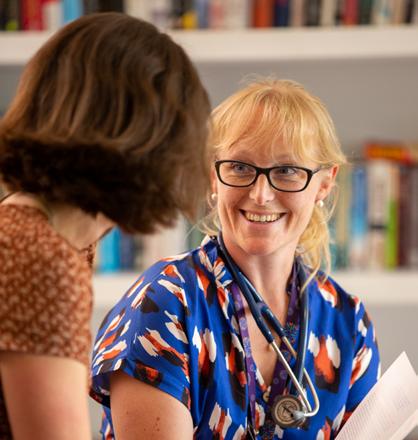
> Transfer to new patient record system
Community services
> Strategy for over the counter donations and corporate donations
> Upgrade existing shops
> Development of staff and volunteers
Further develop
Trinity support services
> Service improvements, incorporating virtual working and skill mix within team
> Transfer to new patient record system
> Re-establish outpatient and group services
> Re-establish pre-pandemic face to face fundraising activity
> Increase profile within footprint north of the river
> Review impact of strategy and prioritise team focus
We will specifically focus on extending our reach among these groups:
> Older people (>85 years)
> People from all ethnic minorities
> People from all faith groups
> People from deprived communities
> People who are socially isolated and lonely
What are we going to do?
> Take proactive steps to make Trinity a place for everybody
> Build on LGBTQ+ work and what people have already told us
> Talk more about death and dying in the community – dispelling myths about the hospice and what we do
What will we need to do it?
> Dedicated staff to deliver community engagement and the Compassionate Neighbours programme
> Commitment from community volunteers
> Identification and removal of cultural barriers within services
> Further work to identify which communities we are underserving
> Introduce a Trinity version of Compassionate Neighbours
> Deliver a community engagement programme focusing on the communities we know are under-represented among our patients
> Strengthen our Clinical Nurse Specialist and interdisciplinary team specialisms in areas such as learning disabilities, homelessness, care homes, transition, frailty
> Collaborate with our partners e.g. third sector, local authorities
> Continue to focus on FREDIE and enhance training for staff
> Inclusive workforce proactively seeking to dismantle bias
> Learning, development and training for staff and volunteers
Fairness
Respect
Equality
D iversity
Inclusion
We span seven London boroughs, three Integrated Care Systems, ten acute hospitals, and share commissioners with seven other independent hospices. Working together in collaboration is essential.

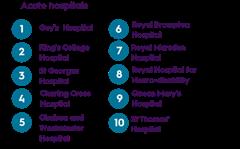

> Enhance our urgent and rapid response: 24/7 admission to the inpatient unit and two hour community response
> Develop direct access pathways for Accident & Emergency Departments and ambulances
> Develop new pathways and expand referral relationships (e.g. geriatricians; acute medicine)
> Establish a dedicated ‘Trinity Ambulance’ and transfer team
> Expand our Care Coordination Service to our whole catchment area
> Increase healthcare professional training and education
> Develop inter-hospice working groups, benchmark and explore joint working opportunities
> Common model of care: core/enhanced offer
> Collaborate on joint commissioning proposal(s)
What will we need to do it?
> Buy-in from partners and commissioners
> Transparency and good communication
> Dedicated management time for partnership working
> New referral pathways with correct staffing to deliver them
> Refined clinical model to allow urgent/rapid response
We will launch the Transform Programme to develop and implement an innovative clinical model of care which will:
> Offer seamless care to patients at the correct intensity for their needs
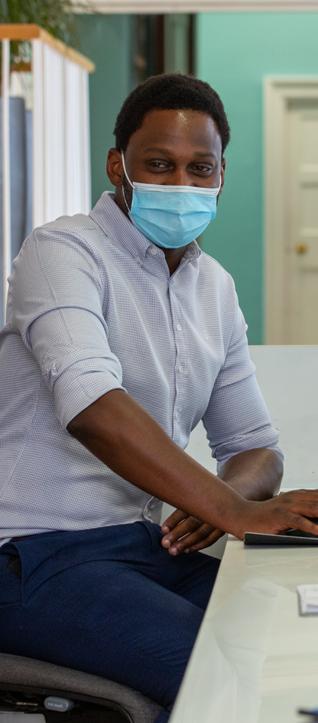
> Maximise the reach and impact of our most highly specialised clinical staff
> Improve efficiency and effectiveness of our services, optimising opportunities for virtual and digital working
> Ensure we are accessible to and accessed by all of the diverse community we serve
We will invest in our infrastructure and workforce to enable the most efficient and effective care to be delivered including:
> Replacing Mulberry Place with state-of-the-art outpatient and clinical hub facilities
> Launching a Trinity Ambulance to support admission and discharge to the inpatient unit and other clinical activity
> Identifying new digital solutions to support efficiency and impact
> Develop a long-term People Plan outlining how we attract, recruit and retain staff and volunteers
We will pilot a number of service initiatives to test concepts and demonstrate impact and sustainability, before incorporating into the new model of care
> Continuing healthcare (CHC) fast track 12 week packages of care
> Expanded bereavement support
> Link with care of the elderly clinicians to better meet the palliative care needs of older people without specific life-limiting diagnoses
> 27% of the costs of running our clinical services is funded by the NHS. Any shortfall in funding needs to be supplemented by retail and fundraising
> Embed new retail strategy: to be “London’s answer to sustainable fashion”

> Grow retail by ~2 new shops per annum
> Increase income from existing shops through staff development and stores upgrade
> New e-commerce strategy will focus on product categories not sold in shops
> Grow corporate donations to 25% of the business
> Develop 5 year fundraising strategy
> Specific fundraising to support infrastructure and growth projects
> Deliver new fundraising initiatives


> Focus on legacy fundraising and Local Business Heroes
> Leverage Compassionate Neighbours programme
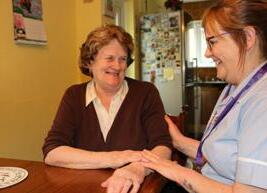
Compassionate neighbours
> Connecting people in the community
> Befriending
> Self-management support & training
Inpatient unit
> 24/7 admissions
> Access to outpatient services on the unit and in hospice
Outpatient services
> Virtual and in-person appointments (in hospice and other community settings)
> Time-limited group activities
> Social prescription model offering menu of shortterm interventions (e.g. 6 weeks of counselling)
Community palliative care team
> Planned care delivered by skill mixed teams ensuring appropriate level of seniority linked to complexity of care (In person and virtual)
> Trinity Carers
> 24/7 rapid response
Educationsupports the model benefiting the MDT, patients and
• Referrals from hospital teams
• Self-referral
• Referrals from healthcare professionals in community (e.g. GP, LAS, CNS, DN)
